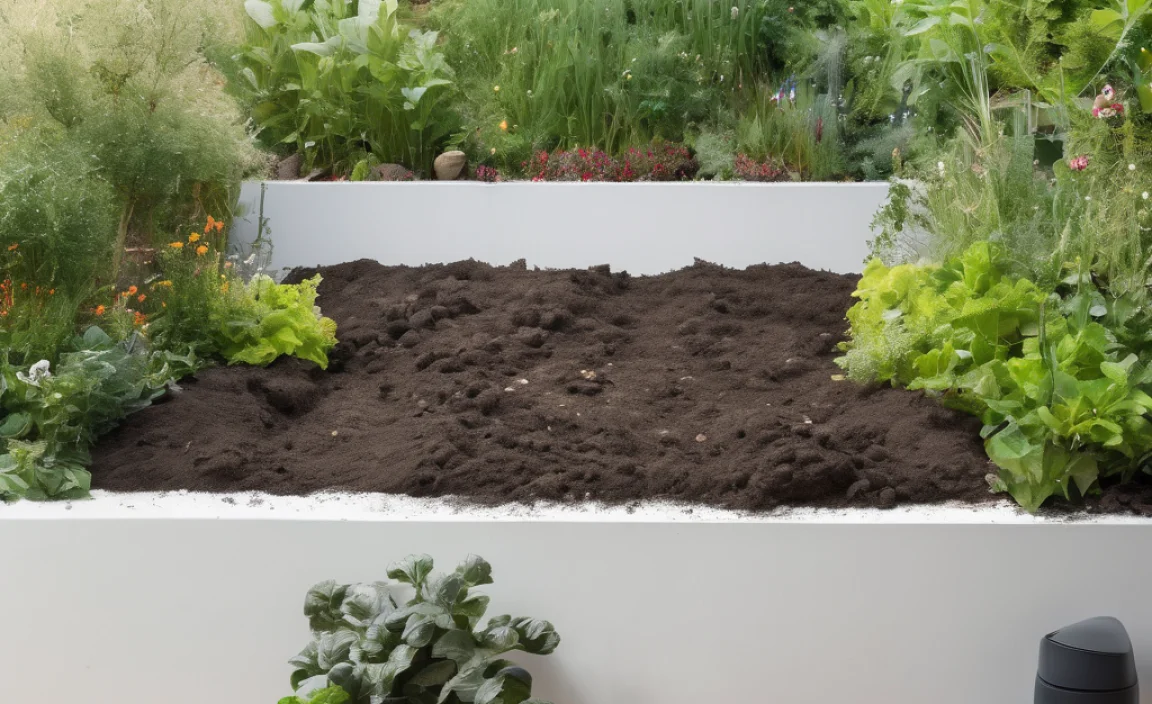Did you know that we can turn kitchen scraps into rich soil? It’s true! This magic happens through composting. In this compost for soil improvement guide, you’ll learn how to make your soil thrive. Have you ever wondered how plants grow so healthy? They get their strength from nutritious soil. Composting is a fun way to help plants and the planet. Let’s explore how you can start this green journey!
Key Takeaways
- Composting enriches soil with vital nutrients.
- Use kitchen scraps to create your own compost.
- Compost helps plants grow strong and healthy.
- Follow this compost for soil improvement guide for best results.
- Composting reduces waste and helps the environment.
Why Composting is Important for Soil
Composting turns organic waste into a powerful soil amendment. It’s like recycling for the earth. By composting, you give back to the soil what you take from it. Think of it as nature’s way of renewing itself. Healthy soil means healthy plants. Plants grown in compost-rich soil are more robust and yield better crops. Are you excited to help your garden flourish?
- Composting draws on nature’s recycling process.
- It enhances soil fertility and structure.
- Composts supply essential nutrients to plants.
- Reduces the need for chemical fertilizers.
- Improves soil water retention capacity.
- Boosts plant disease resistance.
Composting is not just about gardening. It’s about creating a sustainable future. With less waste going to landfills, we can reduce the overall footprint on the Earth. Gardens thrive, and so does our planet. By adding compost, soils become more productive and resilient. So, why not give composting a try?
Fun Fact or Stats : Compost can reduce landfill waste by up to 30%!
How Does Composting Work?
Have you ever wondered what happens to leaves and food scraps when they decompose? These materials break down into humus, a dark, rich substance that feeds the soil. Composting involves gathering organic matter like fruit peels, grass clippings, and dead leaves. These items decompose with the help of microbes. It’s like having tiny workers breaking down waste into useful nutrients. Can you imagine tiny bugs working in your garden?
What Can You Compost?
Do you know what goes in a compost bin? Many items can be composted. Think of fruit and vegetable scraps, coffee grounds, and eggshells. These kitchen scraps break down into helpful soil nutrients. Even grass clippings and dried leaves work well. Avoid adding meat, dairy, and oily foods. These can attract unwanted pests. Isn’t it cool that our food waste can help gardens grow?
Benefits of Using Compost
Compost is like a vitamin boost for your garden. It adds nutrients that help plants grow strong. Compost improves soil texture, making it fluffy and easy for roots to spread. This means plants can access water and nutrients more easily. Healthy soil means fewer pests and diseases. Do you want to see your garden bloom with life?
How to Start Composting at Home
Starting a compost bin at home is easy and rewarding. First, pick a spot in your yard or use a container. Gather materials like fruit scraps, grass, and leaves. Mix them in layers to help them decompose. Keep your compost pile moist but not soaked. Turn it occasionally to let air in. Are you ready to turn your trash into treasure?
- Select a location with good drainage.
- Layer your compost: brown and green materials.
- Moisten the pile without soaking it.
- Turn your compost regularly for aeration.
- Avoid adding meat, dairy, and oils.
- Cover the pile to retain moisture and heat.
Composting at home is like having a mini recycling plant in your backyard. It’s a way to turn waste into something valuable. Over time, your compost will transform into rich, dark soil. This soil will nourish your garden, making it lush and vibrant. Imagine the satisfaction of growing veggies from your own composted soil!
Fun Fact or Stats : A small compost bin can reduce household waste by 30%.
Choosing the Right Compost Bin
Are you wondering which compost bin is best for you? There are many options, from simple heaps to fancy tumblers. A basic open heap works for large yards. Tumblers are great for smaller spaces and faster composting. Bin features, like ventilation and turning mechanisms, can make composting easier. Choosing the right one depends on your space and needs. Will you pick one that fits your garden dreams?
Maintaining Your Compost Pile
Keeping a compost pile active requires some effort. Regularly add a mix of green and brown materials. Green materials include grass and vegetable scraps. Brown materials are leaves and twigs. Turn the pile every few weeks to aerate it. Keep it moist, but not soggy. With patience, your compost will turn into a garden treasure. Are you ready for the fun of composting?
When is Compost Ready to Use?
How do you know when your compost is ready? Finished compost has a dark color and earthy smell. It should be crumbly and free of recognizable food scraps. Depending on the method, it can take a few months to a year. When ready, it can be mixed into garden soil. This improves plant health and growth. Can’t wait to see your plants bloom?
Best Practices for Composting Success
To make great compost, follow some simple best practices. First, balance green and brown materials. Greens include fruits and vegetables. Browns are dry leaves and twigs. Next, maintain moisture like a damp sponge. Turn your pile to keep it active. Be patient, as composting takes time. Are you ready to make your perfect compost?
- Balance greens and browns for optimal composting.
- Keep compost slightly moist, never too wet.
- Turn regularly for air and faster decomposition.
- Be patient; composting is a gradual process.
- Avoid adding weeds or diseased plants.
- Chop larger items for faster breakdown.
Best practices ensure your compost pile is efficient and effective. By keeping it balanced, you create the ideal environment for microbes. These tiny creatures break down waste quickly, turning it into valuable soil. The right conditions produce high-quality compost for all your gardening needs. Ready to watch your garden thrive?
Fun Fact or Stats : Composting can save up to 50% of garbage space!
Adding Worms to Your Compost
Have you heard of worm composting? It’s a fun way to speed up composting with worms. These special worms, called red wigglers, love eating kitchen scraps. They turn waste into nutrient-rich worm castings. Worm bins are small, making them perfect for homes. Worms work faster than microbes alone. Are you ready to invite worms to your composting party?
Understanding Compost Layering
Why is layering important in composting? Layers help control moisture and airflow in your compost pile. Start with a base layer of coarse materials like twigs. Add alternating layers of browns and greens. This creates a balanced environment for decomposition. Think of it as a composting sandwich. Are you excited to build your compost masterpiece?
Dealing with Compost Pests
Are pests bothering your compost pile? Proper care can keep unwanted visitors away. Avoid adding meats and oily foods, which attract pests. Cover fresh materials with soil or leaves. Keep the pile aerated and balanced. With these tips, pests won’t spoil your composting efforts. Ready to keep your compost healthy and happy?
Using Compost for Soil Improvement
What happens when you add compost to soil? Compost improves soil structure and fertility. Plants grow stronger with compost’s rich nutrients. It acts like a natural fertilizer, boosting plant health. Compost increases water holding capacity, reducing the need for watering. Are you excited to see your garden flourish with compost?
- Mix compost into garden soil for better growth.
- Compost enriches soil with vital nutrients.
- Enhances soil aeration for plant roots.
- Improves water retention in sandy soils.
- Use as mulch to suppress weeds.
- Reduce the need for chemical fertilizers.
Using compost in your garden is like giving it a vitamin boost. Plants benefit from the extra nutrients and improved soil structure. Healthy soil means less disease and stronger growth. Adding compost is easy and effective. Imagine your garden blooming with vibrant colors and lush greenery!
Fun Fact or Stats : Composting can improve soil health by up to 25%!
How Much Compost Should You Use?
How much compost does your garden need? Generally, mix 1-3 inches of compost into the topsoil. For flower beds, use more compost to enrich the soil. Too much compost may harm plants, so balance is key. Compost should be mixed thoroughly for best results. Are you ready to see your garden thrive with the right amount?
Impact of Compost on Plant Growth
Have you seen the difference compost makes on plants? Plants with compost grow stronger and healthier. They have more flowers and fruits. Compost reduces the need for chemical fertilizers. It helps protect plants from diseases and pests. Who wouldn’t love a garden full of happy, healthy plants?
Composting for Different Soil Types
Did you know different soils need different amounts of compost? Sandy soil benefits greatly from compost. It improves water retention and nutrient levels. Clay soil also improves with compost. It becomes lighter and drains better. Composting helps all soil types become more productive. Are you ready to match compost with your soil type?
Conclusion
Composting is a simple way to enrich your garden and help the planet. This compost for soil improvement guide shows you how easy it can be. By turning waste into gold, you’ll see your garden bloom. Composting not only helps plants but also reduces waste. Start composting today and watch your garden thrive!
FAQs
Question: What is compost?
Answer: Compost is decomposed organic matter used to improve soil. It includes kitchen scraps, garden waste, and other natural materials. By breaking down, these materials enrich the soil with nutrients. This helps plants grow stronger and healthier.
Question: How can I start composting at home?
Answer: Start by choosing a spot in your yard or a bin. Add kitchen scraps and yard waste in layers. Keep your pile moist and turn it regularly. Over time, you’ll have rich compost to use in your garden following our compost for soil improvement guide.
Question: What can’t I put in my compost?
Answer: Avoid adding meat, dairy, and oily foods. These items attract pests and slow decomposition. Also, avoid adding diseased plants or weeds. Proper balance and turning help keep your compost pile healthy.
Question: How long does composting take?
Answer: Composting time varies, taking a few months to a year. Factors include the type of materials and how often you turn the pile. Regular turning and a good balance of green and brown materials speed up the process.
Question: Why is compost good for soil?
Answer: Compost enriches soil with nutrients and improves its structure. It increases water retention and helps plants resist diseases. This compost for soil improvement guide shows how compost benefits gardening and the environment.
Question: Can composting help the environment?
Answer: Yes, composting reduces landfill waste and returns nutrients to the earth. It lowers the need for chemical fertilizers, promoting sustainable gardening. Composting is a simple way to protect and nourish our planet.



